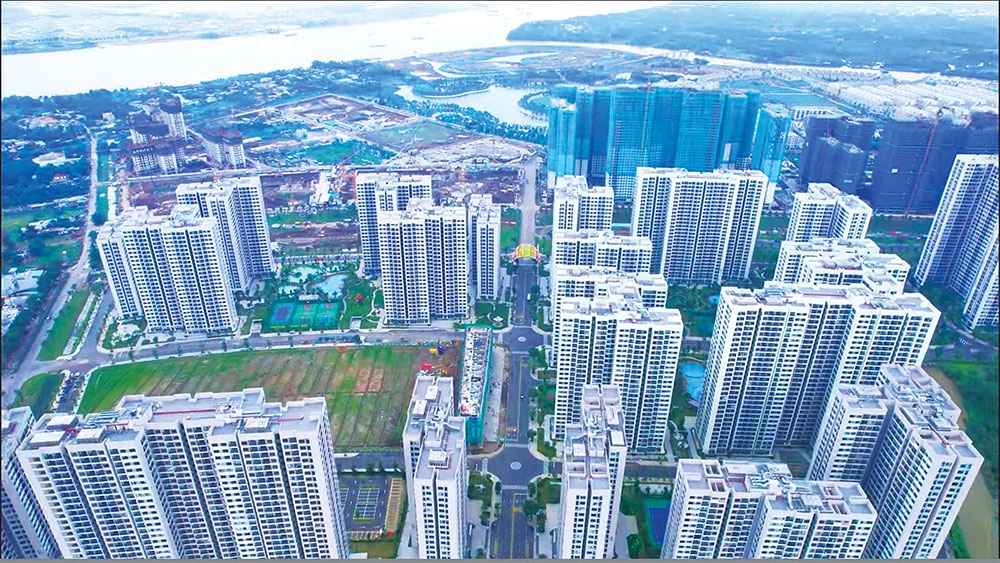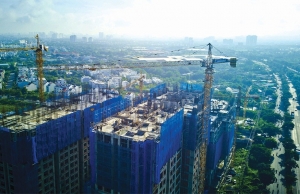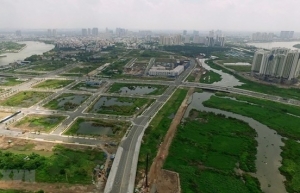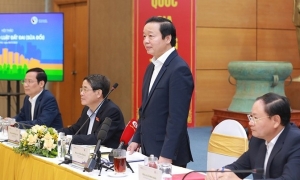Land law points further scrutinised
 |
| Land law adjustments aim to protect entities as well as the real estate market, photo Le Toan |
In a seminar to collect opinions from enterprises and experts regarding amendments to the Law on Land held last week in Ho Chi Minh City, Seck Yee Chung, a representative of the Vietnam Business Forum’s Trade and Investment Working Group, said that Article 35.d of the draft law provided that domestic companies only have the right to mortgages with their land and properties attached to the land at credit institutions licensed to operate in Vietnam.
“This means that companies in Vietnam cannot mortgage their factory or land through foreign lenders, which creates great challenges for them to access competitive financing resources outside the country,” Chung said at the seminar, which was organised by the International Finance Corporation (IFC) and Ministry of Natural Resources and Environment (MoNRE).
“Foreign lenders will look for security assets of Vietnamese companies to secure their lending in here. The most valuable assets of a company include its rights over the project’s land and the construction works attached to the land,” Chung added. “This regulation must be revised because if foreign lenders cannot receive land use rights as secured assets, they would be reluctant to lend through a Vietnamese company.”
A presentative from the IFC, said that mortgaging of land use rights and assets attached to land for loans at international financial institutions is an important avenue that has been applied in many countries. Morgage restriction reduces foreign funding for the Vietnamese private sector and increases the borrowing costs of domestic enterprises, leading to a significant decrease in a competitive advantage over their foreign peers, he explained.
“The cost of foreign loans of Vietnamese enterprises will be increased because loan risks are higher than usual, and the lender will factor this into the loan interest rate. This especially affects large infrastructure and manufacturing projects, which must mobilise foreign financing as domestic investors and credit institutions are not able to meet the large and long-term financing needs of such projects,” the representative said, adding, “In addition, due to regulations on risk management, domestic credit institutions cannot lend to a project or business beyond a certain limit.”
According to the Law on Housing, foreign entities and individuals are entitled to possess houses in commercial housing construction projects. However, according to the draft land law, land users who are entitled to be granted certificates exclude foreigners.
“Consequently, foreigners in Vietnam have been seeking ways to circumvent the law if they desire to possess and conduct transactions on housing; meanwhile, they are not being protected by the Law on Land nor are they entitled to certificates,” Seck Yee Chung said.
Participants at the seminar last week recommended that the legislation’s drafting team consider and supplement regulations on land users in the draft to stipulate that foreign entities and individuals are subject to land use rights recognised by the state. At the same time, consideration should be given to supplementing regulations on the rights and obligations of foreign entities and individuals to use land in Vietnam.
“Without this protection, there is a high risk of black-market developments, real estate bubbles, and distorted housing prices in the top-line segment of residential real estate,” Chung added. “The legislator can counteract these developments by granting foreigners a limited land use right, which is certified in a publicly acceptable form.”
Speaking at the event, MoNRE Deputy Minister Le Minh Ngan acknowledged the large scale of the land law changes. “Preparation and construction must focus on investing effort and intelligence, not only of the agencies directly involved in the legislative process, but all agencies in both the political system and in society,” Ngan said.
The draft Law on Land is set to contain policies such as renewing and improving the quality of land use planning; fulfilling regulations on land allocation, lease, and land use change; regulations on compensation, resettlement, and land recovery for security purposes; and land price determination mechanisms, among other aspects. Policies related to the use of land by enterprises are also included, such as specific provisions on land allocation and lease without auction, land lease with one-time or annual payment, and supplementing regulations for small- and medium-sized enterprises to access land.
According to Ngan, since early this year, over 8,000 direct opinions and 75 documents from individuals and organisations have been sent to the MoNRE. All comments are being fully absorbed by the drafting agency. “We’re determined that the revised law creates a transparent mechanism to improve the efficiency of state management of land, ensure the promotion of resources, and also meet the requirements of the Party and the people,” he stressed.
| Jerome Buzenet-Partner, DFDL | |
Most such countries do not allow foreign lenders to take possession or ownership over the collateral in case of enforcement, which protects the genuine national interest. In that scenario, the foreign lender would only be able to enforce the security over land use rights by way of sale to buyers that are qualified to purchase land use rights under the local laws, and would only be allowed to receive the proceeds of such sale. Some other countries like Myanmar allow foreign lenders to receive indirect mortgages over land use rights through a credit institution acting as a security agency or trustee, which is in charge of the sale of the land use rights to buyers. | |
| Nguyen Van Hau-Vice chairman, Ho Chi Minh City Bar Association | |
The latter proposal is more feasible in practice and ensures compliance with the principle of establishing land use rights and real estate ownership according to law. The provisions of the draft Law on Land itself include the right to mortgage land use rights for credit institutions licensed to operate in Vietnam. We can only add a provision that allows mortgages through foreign credit institutions and bank branches licensed to operate in Vietnam to act as the secured party to borrow capital from foreign lenders, and set up some more regulations on loan limits; this way handling security assets and adjusting in detail the issue of establishing land use rights when handling security assets. Because the credit institution accepting the mortgage is based on the trust of the foreign lender, it is necessary to have specific legal provisions on the rights and obligations of the parties in this case. It is necessary to ensure that the land use rights in the whole process do not belong to a foreign organisation but will be processed for resale or transfer by the mortgage credit institutions. | |
| Nguyen Hong Van-Deputy director of Consulting and Valuation Savills Hanoi | |
Accordingly, the land price according to the state land price list after applying the annual adjustment coefficient is still lower than 60 per cent of the market price. Current problems still revolve around the harmonious settlement of relationships and expectations between people, the state, and businesses to be able to determine a reasonable market land price. To apply land valuation according to market prices, we need to make real estate more transparent. Transaction information in the Vietnamese market has not been made public as well as there is no reasonable and strict mechanism to collect real trading data in the market. Meanwhile, real estate brokers in the market are not well-trained and they do not have strict supervision and management. | |
| Ted Lai-Vice president Finance and Accounting Frasers Property Vietnam | |
We believe investors would value greater guidance on the rationale, framework, and methodology in relation to the above. For long-term investors, they look for certainty in their investments. Without clarity on the guidance and mechanism and certainty in deriving the LUF after the fifth year, investors will not be able to estimate the total LUF for the entire lifespan properly, which contributes significantly to the total project development costs. In turn, this creates uncertainty on the return of the project, which then affects the decisions of investors. On a related note, such guidance and mechanisms could similarly guide investors in determining the value of the extension of the land use rights. |
 | Law on Land amendments to usher in positive changes The revised Law on Land, designed to ease bottlenecks in the real estate market, is also required to ensure synchronisation to improve the efficiency of land management and use. Scheduled to be approved by the National Assembly in 2023, the legislation will act as a driving force for Vietnam’s economy in the next period. |
 | Land law considerations for non-nationals With the current Law on Land, many foreign businesses have encountered multiple challenges related to real estate while investing in Vietnam. Pham Duy Khuong, managing director of ASL Law, explains why the country must remove these issues as soon as possible in order to keep Vietnam attractive. |
 | OVs in Czech Republic contribute ideas to draft revised Land Law Overseas Vietnamese in the Czech Republic actively contributed their ideas to the draft Land Law (revised) at a conference held on March 2 in both online and in-person formats. |
 | Amended Land Law to provide land value index close to market value Both society and the economy may benefit from a land price index that closely reflects market prices. |
What the stars mean:
★ Poor ★ ★ Promising ★★★ Good ★★★★ Very good ★★★★★ Exceptional
Related Contents
Latest News
More News
- Construction firms poised for growth on public investment and capital market support (February 11, 2026 | 11:38)
- Mitsubishi acquires Thuan An 1 residential development from PDR (February 09, 2026 | 08:00)
- Frasers Property and GELEX Infrastructure propose new joint venture (February 07, 2026 | 15:00)
- Sun Group led consortium selected as investor for new urban area (February 06, 2026 | 15:20)
- Vietnam breaks into Top 10 countries and regions for LEED outside the US (February 05, 2026 | 17:56)
- Fairmont opens first Vietnam property in Hanoi (February 04, 2026 | 16:09)
- Real estate investment trusts pivotal for long-term success (February 02, 2026 | 11:09)
- Dong Nai experiences shifting expectations and new industrial cycle (January 28, 2026 | 09:00)
- An Phat 5 Industrial Park targets ESG-driven investors in Hai Phong (January 26, 2026 | 08:30)
- Decree opens incentives for green urban development (January 24, 2026 | 11:18)





 Tag:
Tag:




















 Mobile Version
Mobile Version